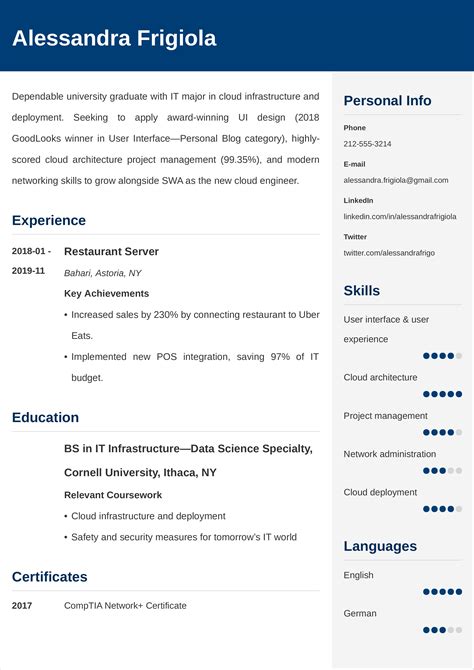The highly competitive world of IT, where a well-crafted resume can make all the difference in landing an entry-level position. As a newcomer to the industry, it's essential to showcase your skills, education, and passion for technology in a clear and concise manner. In this article, we'll provide an entry-level IT resume template and a comprehensive writing guide to help you get started.
Understanding the Importance of a Strong IT Resume
Your resume is often the first impression you make on potential employers, and in the IT industry, it's crucial to make a strong statement. A well-written resume can help you stand out from the competition, showcase your technical skills, and demonstrate your potential to contribute to a company's success.
Key Sections to Include in an Entry-Level IT Resume
When creating an entry-level IT resume, there are several key sections to include:
- Contact Information
- Professional Summary/Objective
- Education
- Technical Skills
- Work Experience (Internships, Volunteer, or Relevant Projects)
- Projects or Personal Initiatives
- Certifications or Relevant Coursework
Entry-Level IT Resume Template

[Your Name] [Address] [City, State Zip] [Phone Number] [Email Address] [LinkedIn Profile (optional)]
Professional Summary: Highly motivated and detail-oriented IT enthusiast with a strong foundation in computer science and a passion for innovative technologies. Proficient in [list technical skills, e.g., programming languages, software, or tools]. Eager to apply my skills and knowledge in a dynamic and growth-oriented environment.
Education:
- Bachelor's Degree in Computer Science, [University Name], [Graduation Date]
- Relevant Coursework: Data Structures, Algorithms, Computer Systems, Networking, and Database Management
Technical Skills:
- Programming languages: Java, Python, C++
- Operating Systems: Windows, Linux, macOS
- Software: Microsoft Office, Adobe Creative Suite
- Tools: Git, AWS, Azure
Work Experience:
- IT Intern, [Company Name], [Internship Dates]
- Assisted in the development of a cloud-based project using AWS
- Collaborated with the team to troubleshoot and resolve technical issues
- Gained experience with agile project management methodologies
- Volunteer, [Organization Name], [Volunteer Dates]
- Provided technical support for a non-profit organization's website and social media platforms
- Developed a basic understanding of web development using HTML, CSS, and JavaScript
Projects or Personal Initiatives:
- Personal Website, [Website URL]
- Designed and developed a personal website using HTML, CSS, and JavaScript
- Implemented responsive design and ensured cross-browser compatibility
- Chatbot Project, [Project URL]
- Created a chatbot using Python and the NLTK library
- Integrated the chatbot with a web interface using Flask
Certifications or Relevant Coursework:
- CompTIA A+ Certification, [Certification Date]
- Certified Scrum Master (CSM), [Certification Date]
Tips for Writing an Effective Entry-Level IT Resume
- Tailor your resume to the job: Customize your resume for each job application, highlighting the skills and experiences that match the job requirements.
- Use keywords and phrases: Incorporate relevant technical keywords and phrases from the job posting to help your resume pass through applicant tracking systems (ATS) and catch the eye of hiring managers.
- Quantify your achievements: Use specific numbers and metrics to demonstrate the impact of your work, such as "Improved website loading speed by 30% through optimization techniques."
- Emphasize soft skills: As an entry-level candidate, it's essential to highlight your soft skills, such as communication, teamwork, and problem-solving, to demonstrate your potential for growth and adaptability.
- Keep it concise and visually appealing: Use clear headings, bullet points, and white space to make your resume easy to read and scan.
Common Mistakes to Avoid in an Entry-Level IT Resume
- Typos and grammatical errors: A single mistake can make a negative impression and raise concerns about your attention to detail.
- Lack of relevance: Failing to tailor your resume to the job and highlight relevant skills and experiences can make it difficult to stand out from the competition.
- Insufficient technical skills: In the IT industry, technical skills are crucial. Make sure to highlight your proficiency in relevant programming languages, software, and tools.
- Poor formatting: A poorly formatted resume can be difficult to read and may not pass through ATS.
Conclusion: Crafting a Winning Entry-Level IT Resume
Creating an effective entry-level IT resume requires a strategic approach, attention to detail, and a clear understanding of the industry's demands. By following the template and writing guide provided, you'll be well on your way to crafting a winning resume that showcases your skills, education, and passion for technology.






What are the most important sections to include in an entry-level IT resume?
+The most important sections to include in an entry-level IT resume are Contact Information, Professional Summary/Objective, Education, Technical Skills, Work Experience (Internships, Volunteer, or Relevant Projects), Projects or Personal Initiatives, and Certifications or Relevant Coursework.
How can I make my entry-level IT resume stand out from the competition?
+To make your entry-level IT resume stand out, tailor it to the job, use keywords and phrases from the job posting, quantify your achievements, emphasize soft skills, and keep it concise and visually appealing.
What are some common mistakes to avoid in an entry-level IT resume?
+Common mistakes to avoid in an entry-level IT resume include typos and grammatical errors, lack of relevance, insufficient technical skills, and poor formatting.
